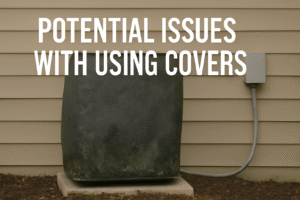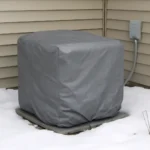As the winter months approach, many homeowners are left wondering: Should I cover my air conditioner for the season? With temperatures dropping and snow on the horizon, it’s a natural thought to protect your air conditioning unit as we do with other outdoor appliances. However, covering your AC unit in winter isn’t always the best option.
In this guide, we’ll explore the reasons why covering your air conditioner may not be necessary, when it might be beneficial, and the potential risks associated with using an AC cover. By the end, you’ll know the best practices for caring for your air conditioner during the colder months.
How to Properly Cover Your Air Conditioner

If, after reviewing the information, you decide that covering your air conditioner is the right choice, it’s essential to do it properly. Here are some tips to ensure your unit remains in good condition:
Use a Breathable Mesh Cover
Avoid using plastic or vinyl covers that restrict airflow. Instead, choose breathable mesh covers that allow air to circulate freely. This will prevent moisture from getting trapped inside and causing rust or mold buildup.
Cover Only the Top of the Unit
It’s recommended to only cover the top of your air conditioner. Full length covers can trap moisture, creating a breeding ground for mold and mildew, and can damage the unit’s components over time.
Secure a Plywood Cover
If you’re concerned about falling debris like leaves or ice, consider using a sturdy piece of plywood over the top of your AC. This will shield the unit without restricting airflow. Just ensure it’s securely fastened and doesn’t completely enclose the unit.
Regularly Inspect the Unit
Even if you cover your AC, it’s important to regularly check the unit for debris or signs of moisture buildup. Keep the area around the AC clean, and remove any ice or snow that accumulates.
Why Covering Your Air Conditioner May Not Be Necessary
While it may seem like a good idea, covering your air conditioner during the winter is generally unnecessary and can actually lead to more problems than benefits. If you have concerns or need assistance with your HVAC system, contact us to learn more about proper care and maintenance.
Modern air conditioners are designed to withstand outdoor elements, including rain, snow, and even extreme cold. Their durable components, such as stainless steel and aluminum, are built to endure the harshest weather conditions. Additionally, the coils and mechanics within the unit are engineered to handle fluctuating temperatures, meaning they don’t require protection in the form of a cover.
When You Should Cover Your Air Conditioner
Falling Debris
If your AC unit is positioned near trees or areas with falling leaves, twigs, or other debris, consider covering it during the fall to prevent clogs and blockages in the coils. However, be sure to use a breathable cover that won’t restrict airflow.
Snow and Ice Build Up
If you live in an area prone to heavy snow or icicles, protecting your AC from excessive ice accumulation may be necessary. However, always ensure that the cover doesn’t trap moisture or restrict airflow.
Consult Your HVAC Technician
For specific recommendations based on your location and weather conditions, it’s always best to consult with your HVAC technician. They can assess your situation and advise you on the best course of action.
Potential Issues with Using Covers
While using an AC cover seems like a simple solution, there are several potential issues that homeowners should be aware of:

Covers Hold Moisture and Cause Mold
One of the most significant risks of should you cover your air conditioner in the winter is moisture retention. While you might believe that a cover will protect your unit from rain or snow, it can actually trap moisture underneath. Over time, this trapped moisture can lead to mold and mildew growth, both of which can damage your air conditioner’s internal components. Rust can form on metal parts, and the electronics can be damaged due to excessive humidity.
Your Air Conditioner is Made to Withstand the Elements
A/C Covers May Cause Pest Problems
When Might You Consider Covering Your AC Unit?
You should consider covering your AC unit during the winter if it’s located in an area with heavy falling debris, or if icicles and snow are likely to accumulate around it. However, always use breathable materials to ensure proper airflow and avoid trapping moisture.
Does Your AC Unit Need a Cover in Winter?
No, modern air conditioning units are designed to withstand all types of weather, including snow, rain, and extreme temperatures. Covers can trap moisture, leading to potential damage to your unit.
Conclusion
Instead of covering your air conditioner, focus on regular maintenance, such as cleaning the unit, checking for debris, and scheduling professional service before the cooling season begins. If you live in an area with heavy debris or snow, use breathable mesh covers that allow airflow, or consider using plywood to protect against falling ice and debris.











